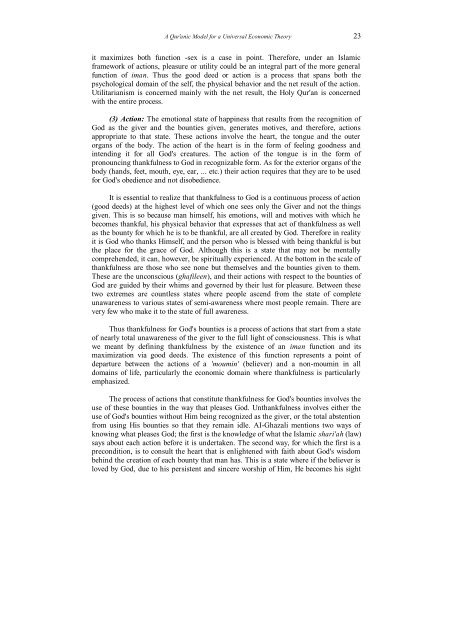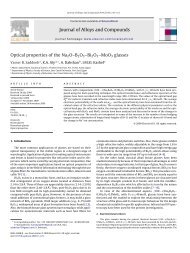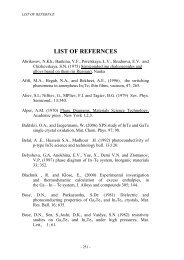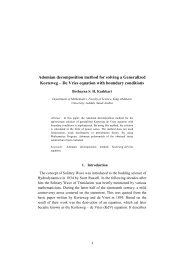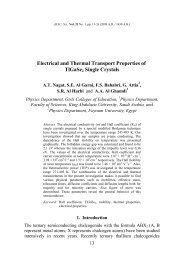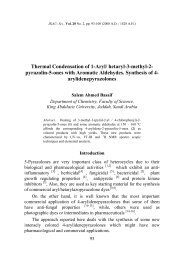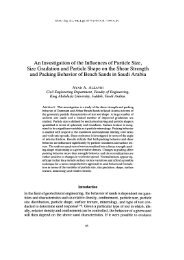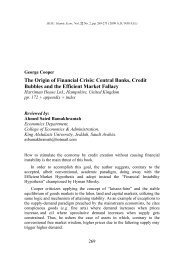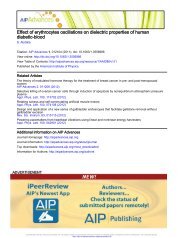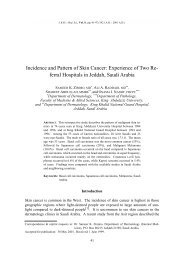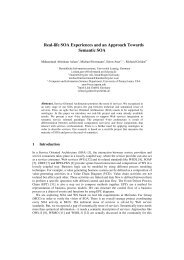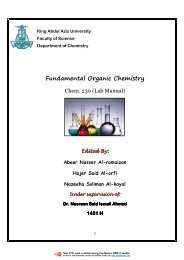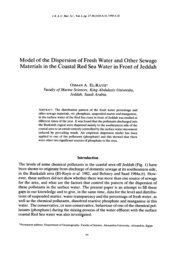A Qur'anic Model for a Universal Economic Theory
A Qur'anic Model for a Universal Economic Theory
A Qur'anic Model for a Universal Economic Theory
You also want an ePaper? Increase the reach of your titles
YUMPU automatically turns print PDFs into web optimized ePapers that Google loves.
A Qur’anic <strong>Model</strong> <strong>for</strong> a <strong>Universal</strong> <strong>Economic</strong> <strong>Theory</strong> 23<br />
it maximizes both function -sex is a case in point. There<strong>for</strong>e, under an Islamic<br />
framework of actions, pleasure or utility could be an integral part of the more general<br />
function of iman. Thus the good deed or action is a process that spans both the<br />
psychological domain of the self, the physical behavior and the net result of the action.<br />
Utilitarianism is concerned mainly with the net result, the Holy Qur'an is concerned<br />
with the entire process.<br />
(3) Action: The emotional state of happiness that results from the recognition of<br />
God as the giver and the bounties given, generates motives, and there<strong>for</strong>e, actions<br />
appropriate to that state. These actions involve the heart, the tongue and the outer<br />
organs of the body. The action of the heart is in the <strong>for</strong>m of feeling goodness and<br />
intending it <strong>for</strong> all God's creatures. The action of the tongue is in the <strong>for</strong>m of<br />
pronouncing thankfulness to God in recognizable <strong>for</strong>m. As <strong>for</strong> the exterior organs of the<br />
body (hands, feet, mouth, eye, ear, ... etc.) their action requires that they are to be used<br />
<strong>for</strong> God's obedience and not disobedience.<br />
It is essential to realize that thankfulness to God is a continuous process of action<br />
(good deeds) at the highest level of which one sees only the Giver and not the things<br />
given. This is so because man himself, his emotions, will and motives with which he<br />
becomes thankful, his physical behavior that expresses that act of thankfulness as well<br />
as the bounty <strong>for</strong> which he is to be thankful, are all created by God. There<strong>for</strong>e in reality<br />
it is God who thanks Himself, and the person who is blessed with being thankful is but<br />
the place <strong>for</strong> the grace of God. Although this is a state that may not be mentally<br />
comprehended, it can, however, be spiritually experienced. At the bottom in the scale of<br />
thankfulness are those who see none but themselves and the bounties given to them.<br />
These are the unconscious (ghafileen), and their actions with respect to the bounties of<br />
God are guided by their whims and governed by their lust <strong>for</strong> pleasure. Between these<br />
two extremes are countless states where people ascend from the state of complete<br />
unawareness to various states of semi-awareness where most people remain. There are<br />
very few who make it to the state of full awareness.<br />
Thus thankfulness <strong>for</strong> God's bounties is a process of actions that start from a state<br />
of nearly total unawareness of the giver to the full light of consciousness. This is what<br />
we meant by defining thankfulness by the existence of an iman function and its<br />
maximization via good deeds. The existence of this function represents a point of<br />
departure between the actions of a 'moumin' (believer) and a non-moumin in all<br />
domains of life, particularly the economic domain where thankfulness is particularly<br />
emphasized.<br />
The process of actions that constitute thankfulness <strong>for</strong> God's bounties involves the<br />
use of these bounties in the way that pleases God. Unthankfulness involves either the<br />
use of God's bounties without Him being recognized as the giver, or the total abstention<br />
from using His bounties so that they remain idle. AI-Ghazali mentions two ways of<br />
knowing what pleases God; the first is the knowledge of what the Islamic shari'ah (law)<br />
says about each action be<strong>for</strong>e it is undertaken. The second way, <strong>for</strong> which the first is a<br />
precondition, is to consult the heart that is enlightened with faith about God's wisdom<br />
behind the creation of each bounty that man has. This is a state where if the believer is<br />
loved by God, due to his persistent and sincere worship of Him, He becomes his sight


